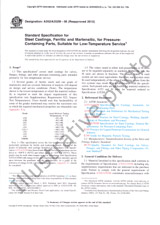We need your consent to use the individual data so that you can see information about your interests, among other things. Click "OK" to give your consent.
ASTM D5602/D5602M-18(2022)
Standard Test Method for Static Puncture Resistance of Roofing Membrane Specimens
Translate name
STANDARD published on 1.11.2022
The information about the standard:
Designation standards: ASTM D5602/D5602M-18(2022)
Publication date standards: 1.11.2022
SKU: NS-1088719
The number of pages: 4
Approximate weight : 12 g (0.03 lbs)
Country: American technical standard
Category: Technical standards ASTM
The category - similar standards:
Annotation of standard text ASTM D5602/D5602M-18(2022) :
Keywords:
insulation substrate, membranes, puncture, roofing, static, test method,, ICS Number Code 91.100.50 (Binders. Sealing materials)
Additional information
| Significance and Use | ||||
|
5.1?An important factor affecting the performance of many membrane roofing systems is their ability to resist static puncture loads. This test method provides a means for assessing static puncture resistance. 5.2?This test method can be used to compare the puncture resistance of a single type of membrane as a function of a variety of insulation substrates or, conversely, to compare the resistance of a number of membrane specimens set on a single type of insulation. 5.3?The effect of temperature on puncture resistance can be studied by conducting the test under controlled conditions using such equipment as an environmental chamber, oven, or freezer. 5.4?This test method can be useful for developing performance criteria for membrane roofing systems. 5.5?This test method can be useful for developing classifications of the static puncture resistance of membrane roofing systems. 5.6?While it is considered that the results obtained by this laboratory test can afford a measure of the static puncture resistance of membrane roofing systems in the field provided that service loads and temperature conditions are known, no direct correlation has yet been established. 5.7?This test method can be useful for evaluating the static puncture resistance of membranes used in vegetative roof systems. |
||||
| 1. Scope | ||||
|
1.1?This test method covers evaluation of the maximum static puncture load that roofing membrane specimens can withstand without allowing the passage of water. 1.2?This laboratory test is conducted at any desired temperature using sheet membrane specimens manufactured in a factory or prepared in a laboratory. 1.3?Roof membrane specimens to which the test method is applicable include bituminous built-up, polymer-modified bitumens, vulcanized rubbers, non-vulcanized polymeric, and thermoplastic materials. 1.3.1?The applicability of this test method to these membrane specimens includes their use in vegetative roof systems. 1.4?This test method is not applicable to aggregate-surfaced membrane specimens, but it is applicable to specimens having factory-applied granules. 1.5?The values stated in either SI units or inch-pound units are to be regarded separately as standard. The values stated in each system may not be exact equivalents; therefore, each system shall be used independently of the other. Combining values from the two systems may result in nonconformance with the standard. 1.6?This standard does not purport to address all of the safety concerns, if any, associated with its use. It is the responsibility of the user of this standard to establish appropriate safety, health, and environmental practices and determine the applicability of regulatory limitations prior to use. 1.7?This international standard was developed in accordance with internationally recognized principles on standardization established in the Decision on Principles for the Development of International Standards, Guides and Recommendations issued by the World Trade Organization Technical Barriers to Trade (TBT) Committee. |
||||
| 2. Referenced Documents | ||||
|



 Cookies
Cookies
